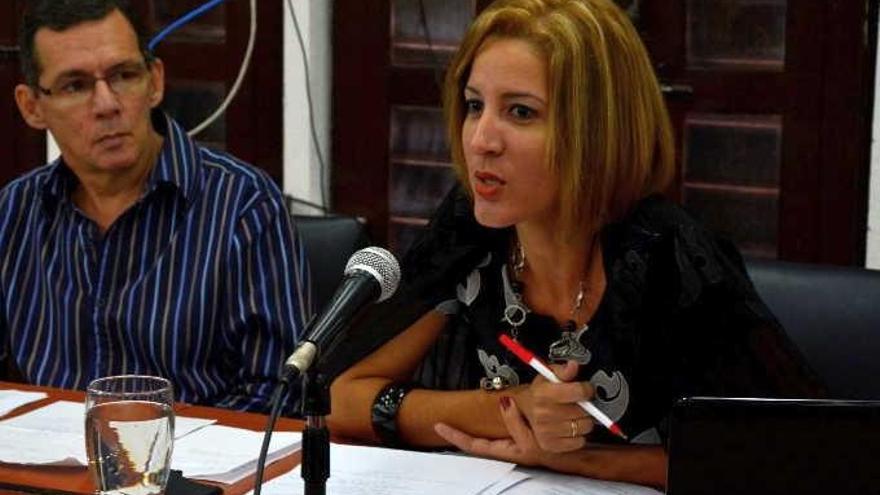
![]() 14ymedio, Madrid, 28 August 2023 — It is not the first time the provincial daily in Sancti Spíritus, Escambray, is at the vanguard of the most daring official press in its critique of the authorities, and the column published on Monday is, perhaps, one of its milestones to date. The article, signed by one of its most well-known voices, Dayamis Sotolongo, is sharp against the measures that present obstacles to the objective of immediacy in reporting. “Failing to report on time is the same as remaining silent,” says the journalist.
14ymedio, Madrid, 28 August 2023 — It is not the first time the provincial daily in Sancti Spíritus, Escambray, is at the vanguard of the most daring official press in its critique of the authorities, and the column published on Monday is, perhaps, one of its milestones to date. The article, signed by one of its most well-known voices, Dayamis Sotolongo, is sharp against the measures that present obstacles to the objective of immediacy in reporting. “Failing to report on time is the same as remaining silent,” says the journalist.
In the article, titled, ¿Callo, después informo? [Keep quiet and then inform?], Sotolongo explains that days ago, professionals were called to a meeting during which the provincial tourism directorate announced a new mechanism for accessing information, which she describes as Machiavellian, implemented by the ministry itself. The procedures they proposed will elicit more than perplexity among editors of any country with a free press.
“To draft anything, from an informative article on the Meliá Trinidad Península hotel to a short piece on Campismo Popular Planta Cantú, journalists must make a formal request where they must provide, in addition to their personal information, the dates in which they plan to conduct their work, the facilities that will be visited, the objectives, whether photos or videos will be taken, the outlets in which the communications products will be publish and, after being analyzed by the Ministry of Tourism’s Directorate of Communication — a lapse which can take days — it will be communicated to the provincial leadership whether or not the work can proceed,” she explains.
Sotolongo made it clear that immediacy is intrinsic to journalism and news cannot wait, because it then stops being news. But, above all, this type of technique is, in fact, contrary to the Social Communication Law approved this year on the Island, the text of which — though it is not yet in effect — is already known.
Article 25 states that responses to media requests for information should be responded to with “timeliness, transparency, and veracity” so that the press can exercise its social function while article 33 forces the media to “act with immediacy, timeliness, and strategic foresight.”
Thus, the columnist believes that the Law is being violated even in spirit. “Information on paper and leaks to the communications media? The law on one side and the discourse on the other? (…) At first glance, many decision makers seem oblivious to these duties. As if putting up barriers to information could then be hidden,” she states.
The article opens with several cases in which Escambray has circumvented the rigidity of the rules to offer information, from the first cases of COVID-19 in Cuba, to the rise of the Zaza river, which almost ended in tragedy, or the real reason for which a 2014 baseball game was canceled by an outbreak of diarrhea. Sotolongo celebrates that the new daily does not expect the authorization of the Ministry of Public Health, Civil Defense or the National Baseball Commission, for these and other cases or “Cuba nor the world would have known” any of that.
The article does not mince words, “Every attempt to trip up access to information is one more step toward censorship.” “If anything has been sadly articulated by Cuban communications is that the media is late to publish what the vox populi has been confirming to to the four winds.” “Discrediting always weighs on everyone.” “This does not only apply to journalists, because failing to tell the truth is not just a crime against journalism.”
The criticism, despite its ferociousness, is not aimed at revindicating a free press, nor does it empathize with independent journalists, who are boycotted and oppressed by the regime. Sotolongo demands good working conditions within the legal margins in Cuba, that is, she only recognizes the official press and launches criticism. “Each time the press loses an opportunity to say, they gain one in lying or in distorting others,” she alludes in writing on social and alternative media.
Sotolongo won the Juan Gualberto Gómez National Journalism Prize in 2019 and is one of the most reputable journalists in the country, specializing in social issues. That same year, she was at the center of a great controversy when the Press and Society Institute (Ipys) decided to award several communicators on the Island during a contest called Cubacron, among them the Escambray journalist and two from the state media, but most were from independent media.
The situation bothered the Union of Cuban Journalists (Upec) and the cuban leadership who described the prize as “U.S. intervention” and accused Ipys of being linked to the “counterrevolution.” Sotolongo rejected the nomination and expressed her distaste for having been included in an award to which she did not apply. “I don’t sell my soul to the devil; they can go to. . .”, said the reporter, without specifying where she wanted to send those who dared issue her the prize.
Translated by: Silvia Suárez
____________
COLLABORATE WITH OUR WORK: The 14ymedio team is committed to practicing serious journalism that reflects Cuba’s reality in all its depth. Thank you for joining us on this long journey. We invite you to continue supporting us by becoming a member of 14ymedio now. Together we can continue transforming journalism in Cuba.
